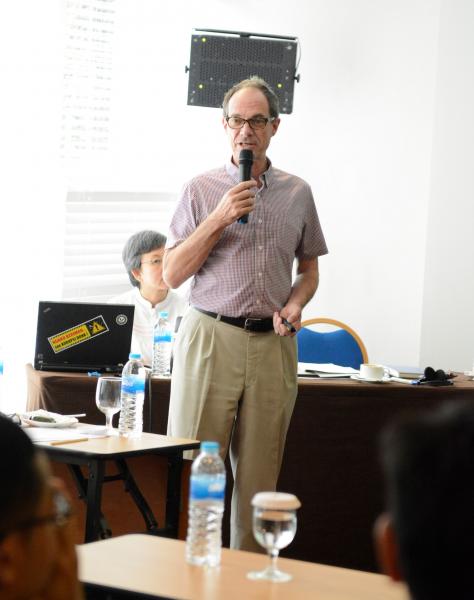By Nissa Cita A., WAVES-Indonesia
There is a growing understanding of how conventional macroeconomic indicators like Gross Domestic Product (GDP) should be complemented with measures of wealth - which includes produced capital, natural capital, human capital, and net foreign assets, all of which eventually lead to earnings - to provide a comprehensive description of a country’s wellbeing.
WAVES-Indonesia plays an active role in discussions about going "beyond GDP" by facilitating knowledge transfers and capacity building for counterparts and relevant communities across the country. Recently, WAVES and the Republic of Indonesia's Ministry of Finance (MoF) organized a three-and-a-half-day training on macroeconomic indicators and wealth accounts, which took place on 6 – 9 March 2018, at the Mercure Hotel in Jakarta.
Members of various ministries and government agencies participated in the training, including from the MoF – Directorate General of Asset Management, the National Bureau of Statistics (BPS), the Ministry of Environment and Forestry, and the Geospatial Information Agency. The training successfully strengthened knowledge and understanding of comprehensive wealth accounts, and ignited discussion on the need for better collaboration, communication, and willingness to sit together and reconcile data.
Ms. Purnama Sianturi, the Director of State Receivables and Other State Assets (PNKNL) at MoF, officially inaugurated and concluded the training. In her remarks, she highlighted the need for more capacity building to ensure that everyone is on the same page in establishing the country’s natural capital accounts.
“The government needs to take structured measures to compile and complete the reporting of information on natural resources,” said Ms. Sianturi.
The MoF is tasked with completing a report on the fiscal potential of natural capital accounting, slated to be complete in 2023.
The training was structured into 12 sessions, which consisted of lectures on theories and concepts, as well as group exercises and question-and-answer sessions.
Keith Jefferis, a development macroeconomist and financial sector specialist from Botswana (pictured at right), facilitated the training with enthusiasm. His co-facilitator Silva Liem invited participants to ask questions, assisted them in clarifying any queries, and helped them to reflect on what they had learned during the previous days. Participatns gradually learned about the importance of the System of Environmental-Economic Accounts (SEEA), and the rationale for why conventional macroeconomic indicators such as GDP, Gross National Product (GNP), and Gross National Savings (GNS) need adjustment to account for a country’s natural resources.
The training also provided guidance for measuring not just current levels of economic development, but also how Indonesia can sustain future development. Participants learned about best practices being implemented in other countries, such as in Botswana, where WAVES provided significant support for institutionalizing natural capital accounting for minerals, land and soil, water, forestry, fisheries, and others resources. Participants also received hands-on practice in calculating Adjusted Net Income (ANI), Adjusted Net Savings (ANS), and wealth accounts for three different countries of their choice, and in interpreting the results.
Participants evaluated the training as satisfactory in terms of the clarity of delivery, the relevance of the topics to the participants’ job descriptions, and the applicability of what they have learned to their current tasks.
WAVES-Indonesia is working hand-in-hand with BPS to develop land accounts. This work has been published in BPS' latest annual report on the Integrated Environmental and Economic Accounts (SISNERLING 2017).
The agenda and presentations from the training can be found here.

